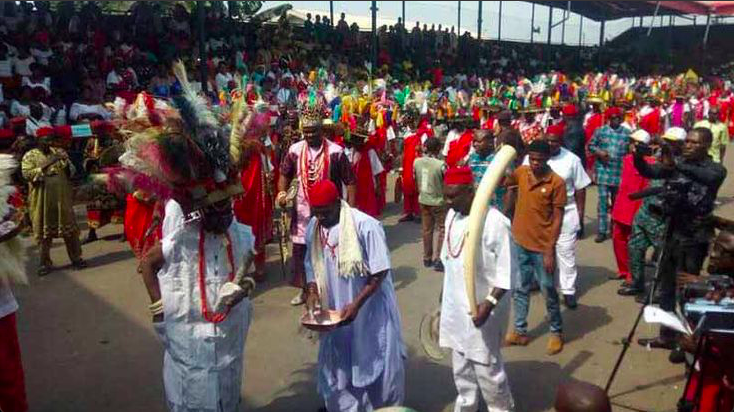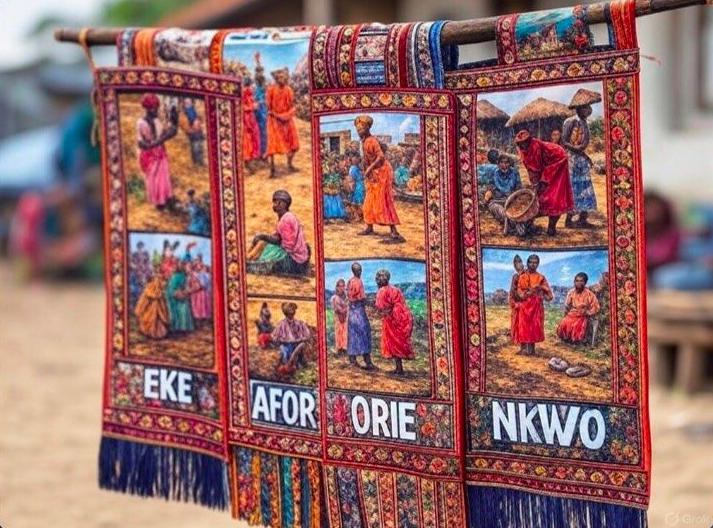“Oge adịghị eche mmadụ.”
Time waits for no one
In the Igbo world, oge (time) is not merely the ticking of a clock or the turning of numbered pages on a calendar. It is a living, breathing rhythm. Time is not chased; it is followed, observed, and honored.
The hours are not ruled by the hands of a clock, but by the crow of the rooster, the cycle of the moon, and the beat of the drum. To speak of time is to speak of the soil beneath your feet, the ancestors behind your back, and the sun above your head.
The Igbo Understanding of Time
In the Igbo mind, time is not an arrow shooting forward into some faraway future. It is a circle, (otu okirikiri) where the end and the beginning meet and embrace.
The Igbo calendar which is known as Ògụ́àfọ̀ Ị̀gbò consists of 13 months (onwa iri na-ato). These 13 months consist of 7 weeks (izù) per month, and each week has 4 days (Eke, Orie, Afo, Nkwo).
The Igbo measure life not just in years, but in the return of familiar rhythms:
- Ụbọchị: The day, with its rising sun and falling shadows.
- Izu: The four-day week, each day bearing its own spiritual and social essence.
- Ọnwa: The moon cycle, guiding planting, harvesting, and rituals.
- Afọ: The year, marked by great communal events like the New Yam Festival (Ịri Ji).
To the Igbos, these cycles are not mere markers, they are living connections between the human world (ụwa mmadụ), the land (ala), and the spirit realm (ụwa mmụọ).
A farmer does not plant because the “date” has come, but because the moon is right, the soil is warm, and the ancestors’ blessings are felt. A festival is not held because it is “July” but because the sacred signs, in nature and in spirit, say it is time.
The Four Igbo Market Days and Their Sacred Significance
In the Igbo world, a week is not seven days but four sacred heartbeats: Eke, Orie, Afo, Nkwo.
These days are not mere names; they carry elemental forces, directional powers, and spiritual weight, forming a cosmic rhythm that shapes Igbo society.
1. Eke: Day of Beginnings (East / Fire)
Eke is tied to the East, the rising sun, and the element of fire. It is the day of beginnings, purification, and spiritual alignment. Traditionally, it was a favored day for oaths, divination, and initiating new ventures. In some communities, farming work begins on Eke to call blessings into the land. Its fiery nature is believed to burn away obstacles, making way for clarity.
2. Orie: Day of Exchange (West / Water)
Orie faces the West and is ruled by the element of water; fluid, connecting, and sustaining. This is the day of bustling trade, as Orie markets are gathering grounds for buying, selling, and renewing social bonds. In the rhythm of the week, Orie is a bridge, a flowing current that links people and communities. Wealth here is not just counted in goods but in the relationships strengthened.
3. Afo: Day of Fertility (North / Earth)
Afo belongs to the North and the element of earth; stable, fertile, and life-giving. It is deeply connected to Ala, the Earth goddess, and is favored for planting seeds, blessing farmlands, and performing rituals for abundance. Those born on Afo are believed to carry the grounded strength of the soil itself.
4. Nkwo: Day of Rest and Craft (South / Air)
Nkwo points to the South and the element of air; light, open, and moving. It is usually a lighter workday, set aside for rest, tool repair, and craftsmanship. Nkwo markets tend to feature artisans: blacksmiths, weavers, woodcarvers. It is a day of reflection and preparation before the week’s cycle turns anew, reminding the community that rest is part of productivity.
Together, these four days keep the heartbeat of Igboland steady. Even today, in many towns, the scheduling of events still bows to the authority of Eke, Orie, Afo, and Nkwo.

The Thirteen Moons of the Igbo Year and Their Significance
The Igbo year (afọ) is measured in living moons (ọnwa) each carrying its own heartbeat, color, and sacred duty. The elders say, “Onwa bụ anya ụwa” — the moon is the eye of the world — for it watches over the land and signals when to work, when to rest, and when to speak with the spirits.
1. Ọnwa Mbụ (First Moon)
This is the opening of the Igbo year, a season of cleansing and renewal. Farmlands are cleared, minds are focused, and the community prepares both physically and spiritually for the journey ahead. It is the moon of beginnings, when intentions are set like seeds in the soil of destiny.
2. Ọnwa Abụo (Second Moon)
In this moon, the land feels the machete’s kiss as weeds are cut away. Farms are prepared in earnest, and people enter the rhythm of hard work. It is a time of shaping possibilities, removing obstacles, and readying the earth for life to take root.
3. Ọnwa Ife Eke (Moon of Sacred Rites)
Here the community turns inward, honoring sacred traditions and performing rituals that strengthen the bond with chi (personal spirit) and Ala (Earth goddess). Certain taboos are observed, reminding all that human life must walk in harmony with cosmic laws.
4. Ọnwa Anọ (Fourth Moon)
The planting season begins. With the coming rains, the earth’s womb opens, receiving seeds with quiet patience. Farmers plant not only with their hands but with faith, trusting Ala to bless the hidden work beneath the soil.
5. Ọnwa Agwụ (Moon of Agwu)
This is the spiritual moon, dedicated to Agwu, the patron of diviners, healers, and creative insight. Initiations are carried out for those called to spiritual work, and the unseen world feels closer, whispering its secrets to the attentive.
6. Ọnwa Ifejiọkụ (Moon of the Yam God)
The young yam plants stretch toward the sky, and prayers rise with them. Offerings are made to Ji, the yam deity, for protection from pests and for a bountiful harvest. Gratitude to the earth deepens, even before the harvest arrives.
7. Ọnwa Alọm Chi (Moon of Personal Destiny)
This moon belongs to the spirit within. Individuals reflect on their path, honoring their chi and making choices that align with their life’s divine pattern. It is a season for personal vows and self-alignment.
8. Ọnwa Ilo Mmụọ (Moon of Spirit Visitations)
The ancestors draw near, and masquerades (mmanwụ) take to the village square, swirling in raffia and mystery. The air feels charged, as if the worlds of the living and the dead overlap. This is a moon of connection and reverence.
9. Ọnwa Ana (Moon of the Earth Goddess)
The earth herself is honored. Festivals for Ala are held, wrongs against the land are confessed and cleansed, and the moral balance of the community is restored. Justice and fertility are her gifts in return.
10. Ọnwa Okike (Moon of Creation)
This moon celebrates the order and beauty of the world. It is a thanksgiving for the balance between man, nature, and the spirit realm, a recognition that creation is both gift and responsibility.
11. Ọnwa Ajana (Moon of Abundance)
The barns swell with yams, and the people rejoice. This is the height of the harvest season, a time of sharing, feasting, and community warmth. The land smiles, and the people answer with generosity.
12. Ọnwa Ede Ajana (Moon of Harvest Rest)
After the rush of gathering, the community exhales. Work slows, and people enjoy the fruits of their labor. Marriages are celebrated, houses repaired, and titles conferred. It is the season of leisure earned by effort.
13. Ọnwa Ụzọ Alụsị (Moon of Pathways to the Deities)
The year bows out in gratitude. Offerings are made to the gods and ancestors, asking for their guidance into the next cycle. This moon is both an ending and a beginning, a threshold between the past and the future.
And when Ọnwa Mbụ returns, the circle completes, for in the Igbo view, time does not run away from us but dances in a circle, inviting us to join the rhythm of the land, the spirits, and the sky.
To walk the Igbo calendar is to walk in rhythm with the ancestors, to let each market day whisper its wisdom, each season hum its truth. It is not just time we keep, but memory, meaning, and the heartbeat of a people.
Keeping the Igbo calendar alive is keeping the Igbo identity alive.
